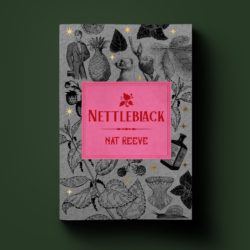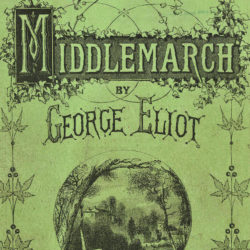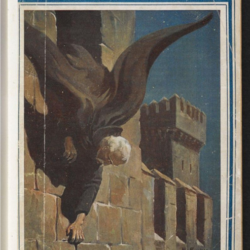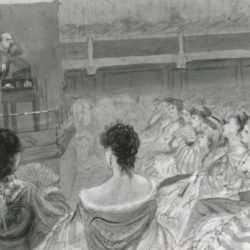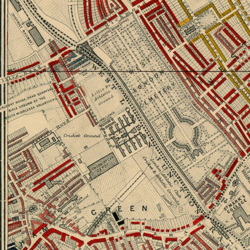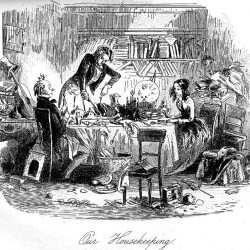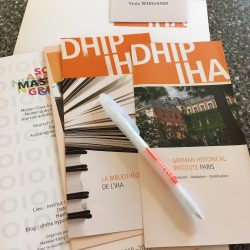Nat Reeve is a novelist and AHRC-funded PhD candidate at Royal Holloway, University of London. Their debut novel, Nettleblack, is out June 23rd 2022 with Cipher Press, with a sequel forthcoming in 2023. Nat’s PhD project is a queer reading of Elizabeth Siddal’s art and poetry, featuring unruly Books of Hours, tree-person hybrids, sapphic musicians … Continue reading “‘The Gumption I Write With’: The Chaotic Journals of (Neo)Victorian Characters”
Category: Research
‘I know no speck so troublesome as self’: Finding Middlemarch through Corpus Linguistics
Dr Rosalind White, (@DrRosalindWhite on Twitter) research associate at the University of Birmingham’s Centre for Corpus Research and on #FindingMiddlemarch at Royal Holloway, University of London, proposes a way into George Eliot’s Middlemarch using corpus linguistics. In this blog post, I’d like to explore how corpus linguistic tools can be used to illuminate the semantic texture of George … Continue reading “‘I know no speck so troublesome as self’: Finding Middlemarch through Corpus Linguistics”
Looking through the windows in Stoker’s Dracula
In this post, Marta Palandri (@hardlyanitgirl on Twitter) discusses the symbolism of windows, light and darkness in Bram Stoker’s Dracula. This post is part of the BMI Lockdown Life series, published in collaboration with the Birmingham & Midland Institute blog. Join the conversation at #BMILockDownLife. “They simply seemed to fade into the rays of the … Continue reading “Looking through the windows in Stoker’s Dracula”
Sikes and Nancy: Dickens and audience
In this post, Dr Caroline Radcliffe (University of Birmingham), discusses the dramatic quality of Dickens’s writing. She reflects on Dickens’s own dramatised reading, Sikes and Nancy, adapted from Oliver Twist, of which she directed a performance at the BMI in 2017 as part of the CLiC Dickens Day. This is a post of the BMI … Continue reading “Sikes and Nancy: Dickens and audience”
Good Neighbours, Good Friends? Navigating Neighbourhoods, Communities and Connection in Dickens
In this post, Dr Emily Bell (Loughborough University) explains how she has used CLiC to explore the theme of neighbourhoods in Dickens’s works. Emily is also an editor of the Dickens Letters Project and has recently been appointed as a fellow of the Software Sustainability Institute (SSI) – we look forward to learning more about … Continue reading “Good Neighbours, Good Friends? Navigating Neighbourhoods, Communities and Connection in Dickens”
Dialect and the dead: Charles W. Chesnutt and the voices of the US South
To mark the launch of the African American Writers Corpus 1892-1912 (AAW; beta release), this guest post by Dr Jimmy Packham introduces one of the key authors of the AAW corpus, Charles W. Chesnutt. Jimmy is a Lecturer in North American Literature at the University of Birmingham and is a specialist in gothic fiction, including … Continue reading “Dialect and the dead: Charles W. Chesnutt and the voices of the US South”
Conversations in the CLiC corpora: Exploring their potential as models for dialogue in ELT
In this post, Chris Jones (University of Liverpool) shows how the CLiC quotes subsets can be explored to aid English language teaching. He provides a sample activity from his recent open access article in the Journal of Second Language Teaching & Research, co-authored with David Oakey. Nineteenth century fiction may seem an unlikely place to … Continue reading “Conversations in the CLiC corpora: Exploring their potential as models for dialogue in ELT”
The Decline and Fall of Cutlery and the Domestic Man
In this guest post, Katherine Jackson (Royal Holloway) demonstrates how searching for items of cutlery in the CLiC corpora can shed a light on the cultural context of 19th century Britain and the gender conventions of the time. If you enjoy this post, also make sure to check out her recent Technecast podcast on her … Continue reading “The Decline and Fall of Cutlery and the Domestic Man”
Liminality in David Copperfield
In this guest post, Sophie Phelps explores ‘liminal’ Dickensian characters who are not quite children and not quite adults, as she shows with a case study of David Copperfield’s “child-wife” Dora. We think this topic is a fantastic fit for us: questions of characterisation in Dickens’s writing are very dear to the CLiC project. Childhood is … Continue reading “Liminality in David Copperfield”
Inspiration for corpus linguistics and stylistics: #dhmasterclass
This post reflects on the Digital Humanities Masterclass 2018 (#DHMasterclass) in which I participated at the German Historical Institute in Paris. [There’s an institute like this in London as well, by the way!] The masterclass was meant to bring together researchers working with digital tools and historical materials (particularly with autobiographical sources) from France and Germany … Continue reading “Inspiration for corpus linguistics and stylistics: #dhmasterclass”

